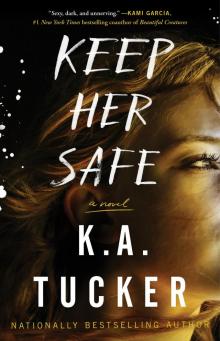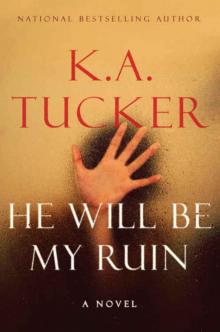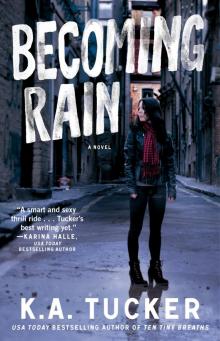- Home
- K. A. Tucker
The Simple Wild Page 8
The Simple Wild Read online
Page 8
I hazard a glance. Jonah is strolling across the lot toward the hangar, his gait casual and assured. He turns my way once, before dismissing me entirely without so much as a wave.
Good riddance. If I don’t have to deal with him for the rest of the week, I’ll be more than happy.
The drive to my father’s house is not far—not even five minutes—and along lonely roads, the paved one riddled with yawning cracks, the dirt ones peppered with countless potholes. The few houses we see as we pass are basic, functional structures, mostly modular homes clad with colorful siding, all of them sitting above the ground on wooden legs. Because of the permafrost, Agnes explains.
I’ve made a mental note to look up “permafrost” in the dictionary when I have internet again.
Agnes has her seat pulled forward as far as it can go and sits straight-backed so she can see over the dash, her diminutive stature a challenge behind the wheel in a pickup truck. If I were in a more relaxed mood, I’d probably find it amusing.
But it helps to be with Agnes. She’s as calm in person as she was on the phone, her voice a lull as she points out the basic landmarks: the “city” of Bangor about five miles to the east, and the Kuskokwim River beside it. That’s the thick, snaking river I saw from above. She says it’s a main artery off the Bering Sea and it stretches far to the north, allowing for travel between villages by barge and boat during the warmer months and by vehicle once it has frozen over in winter. It’s the only way to drive a car to the villages, apparently, because there aren’t any roads to connect Bangor to the rest of the state.
On a clear day, Agnes promises I’ll be able to see Three Step Mountain in the far distance. Right now, though, all I see are miles upon miles of flat land freckled by low bushes, and capped by foggy skies.
And a sleepy moss-green modular home at the end of a long, narrow driveway, banked by a garage and two small utility sheds.
“Well . . . here we are,” Agnes murmurs, cutting the engine.
My father’s home. The place where I spent the first two years of my life.
Even though I don’t remember any of it, everything about this moment feels surreal.
I take a deep breath as I climb out of the truck and trail Agnes up a set of creaky wooden steps, and through a single door, only vaguely aware that she didn’t bother to use her key. The door was already unlocked.
I stop dead in my tracks and my eyes widen with shock as I take in the army of green mallard ducks. The atrocious wallpaper covers every square inch of kitchen wall. It’s not a large kitchen, by any means, which makes it feel all the more enclosed.
As horrendous as it is, I stifle the sudden urge to giggle. This must be what my mother was talking about. I can’t wait to tell her that she was right, that she does still know my father.
Agnes tosses the truck keys onto the counter. “Wren always forgets to open these before he leaves in the morning.” She stretches onto her tiptoes to yank the cord attached to the blinds on the window over the sink, allowing the murky daylight in to illuminate the golden oak cabinets, the cream-colored laminate countertop, and the matching shade of vinyl flooring—a pattern of squares with small burgundy triangles accenting each corner. It reminds me of the flooring my grandparents had in their basement.
With only the small window above the sink, the one in the door, and a single-bulb light fixture above, it’s dim in here. I can only imagine how oppressive it would feel during the long winters.
“When does it get dark, anyway?” I ask, curling my arms around my chest more for comfort than heat.
“At this time of year? The sun sets just before midnight, and then rises around a quarter past four, but it doesn’t get really dark at night right now. Not like it does in the winter.”
My eyes widen. I knew the days were long, but a midnight sunset?
“I replaced the blackout shades in your room. The old ones were tattered. You’ll definitely want to draw those. Unless you’re like your father, who doesn’t mind sleeping in daylight.” Agnes wanders to the fridge. “You must be hungry. Help yourself to whatever’s in the . . .” Her brow crinkles as she holds the door open to show shelves bare of food, save for some condiments and a few beverages. “He promised he’d go grocery shopping,” she mutters under her breath, quiet enough that I don’t think she meant me to hear it. She lifts the carton of milk, to open it and give it a sniff. Her nose crinkles. “I wouldn’t drink this, if I were you.”
“It’s okay. I can’t drink milk anyway. I have a dairy allergy.” I was diagnosed with it when I was five. Something I’m sure my father doesn’t remember.
She pushes the fridge closed. “I’m sure he was waiting until he could see what you like.” She gives me a tight smile. “Meyer’s opens at eight thirty. He’ll take you there first thing.”
It’s a good thing I’m not hungry, then.
Yet again, I can’t help but wonder if my dad actually wants me here. Surely he could have grabbed a few basic food items to have in the house to feed his daughter when she arrived. If he cared enough to.
“When exactly did you tell him that I was coming?”
Agnes hesitates, reaching for the stack of mail that sits on the counter, slowly rifling through it, her eyes stuck on the labels. “Last night.”
I think back to our email exchange from Friday, when I wrote to tell her that I had booked the plane ticket—thank you, Simon, for footing the bill. She wrote back saying that my dad was so happy that I was coming.
That was obviously a lie.
Why didn’t she tell him on Friday, right after receiving my email? Why did she wait another day? Was she expecting him to be something other than “so happy”? What did he say when she told him? What words were exchanged within these walls about my arrival, and with what tone?
Abandoning the unopened mail, Agnes sets to picking dried leaves off a basil plant that sits on the top shelf of a tiered stand by the door, her face pulled into a frown of concentration. “Make yourself comfortable, Calla. Your dad should be back soon.”
“Sure.” My gaze flutters about. I feel anything but comfortable right now. The kitchen certainly has all the necessities—the basic white stove and fridge, a simple round wooden dining table set that wears plenty of dents and scratches from years of use, a worn stainless steel sink with a window above it that overlooks the sprawling, flat landscape. And yet, nothing about the space is particularly welcoming. It’s not like our spacious and bright kitchen in Toronto, with the dreamy bay window and the cushioned window seat that runs alongside it, an inviting corner to curl up in with a book and a hot chocolate on a cold winter’s day.
But maybe my discomfort has nothing to do with the décor and everything to do with the fact that whatever excitement I was feeling over seeing my father has quickly been squashed by the mounting dread that I am unwelcome here.
I inhale. The air is ever so faintly tinged with the acrid smell of burnt wood and ash, like that from a woodstove. Not cigarettes, I note. “He quit smoking, right?”
“He’s working on it. Come on. I’ll show you to your room.” Agnes leads me out of the kitchen and into a long, narrow living room. At least this side of the house is free of mallard ducks, but it’s also void of any personality. Equally dim, even with a light shining from overhead. The walls are white, with a few pieces of unremarkable snowy landscape artwork; the carpet is a shabby oatmeal color, a worn path from the threshold to the simple black woodstove atop beige tile in the far corner visible.
“When your dad’s not working, this is where you’ll find him. Here, or out there.” She casts a hand toward a screened-in porch on the other side of a window that’s larger than the one in the kitchen but still much too small for this size of room.
Aside from a few folded newspapers sitting in a heap on a wooden coffee table, it doesn’t look like the room is used much. As ever, Alaska Wild is clearly his priority.<
br />
But there, sitting on a side table on the far end of the gold-black-and-green woven couch, is the infamous checkers board. I wonder if it’s the same one from oh so long ago.
I feel Agnes’s eyes on me. “It’s . . . cozy,” I offer.
“You’re as bad a liar as Wren.” She smiles. “I keep tellin’ him the place needs freshening up. I’ve even left a few of those home renovation shows playin’ on the television for him,” she waves a hand at the small flat-screen that sits in the corner, opposite the woodstove and across from a tan-colored La-Z-Boy, “but he keeps saying he’s not around enough to bother.” Her voice drifts, her gaze settled on that chair, her seemingly permanent smile slipping.
Why doesn’t she do it herself, then? Won’t he allow her?
“He’ll be home more in the coming weeks, though, right?”
“Yes, I suppose so.”
There’s no point dancing around the topic of my dad’s cancer diagnosis anymore. “How bad is it, Agnes?”
She shakes her head. “That slip of paper was full of medical babble that I couldn’t understand.”
“But he told you what the doctors said, right?”
“Who, Wren?” She snorts softly. “He was sick for weeks with a terrible chest cold before I finally convinced him to go see someone. The doctor decided to run an X-ray and that’s how they found the tumor. He didn’t tell anyone, though. He just took his antibiotics, and I assumed he was getting better. Then the bugger flew to Anchorage for a secret biopsy and more testing.” I can hear the frustration in her voice. “All I’ve been able to get out of him is that he has lung cancer and the doctors have suggested chemo and radiation.”
“It sounds like they have a plan, then.” I’d spent a bit of time on the Canadian Cancer Society website while waiting for my connecting flights today, reading up on types and stages and treatment options for lung cancer. It was a lot to sift through, and difficult to understand. All I managed to take away is that treatment is crucial and survival rates are among the lowest of all cancers.
“If I could see that paperwork, maybe I could Google—”
“I don’t know where it is. He took it when I confronted him. Made me promise not to tell anyone.”
A promise she obviously broke by calling me.
My own frustration begins to build. “When do the doctors want to start it all?”
“Next week. He has to go to the cancer clinic in Anchorage for it; that’s the closest one. Jonah said he’d fly him back and forth, so he can be comfortable at home on the off days.”
It’s a good thing Jonah’s much more willing to fly to Anchorage for my father than for me, at least.
My gaze drifts over the inhospitable living room. “Why don’t you go ahead and redecorate, then, while he’s gone?” Some paint color, new artwork, a few lamps. Anything would be an improvement at this point.
Amusement flashes in her eyes now. “Just come over to Wren’s house and tear down that hideous wallpaper in the kitchen?”
Her words catch me off guard. “You mean you don’t live here?”
“Me? No. I live in the little white house across the road. We passed it on the way in.”
“Oh . . .” The puzzle pieces that I’d begun putting together—an understanding of my father’s life—suddenly don’t fit. “So you’re neighbors?”
“For thirteen years now. Your dad owns the house. I rent it from him.”
Neighbors. Coworkers. Friends.
And “it’s complicated.”
I trail her down the narrow hall, digesting this new information. “I still think you should do it. My mom painted Simon’s bookcases one weekend while he was out of town for a convention.” Simon had paid a small fortune for the golden oak custom units before he met my mother. She despises golden oak.
I remember watching the blood drain from his face when he walked through the door to see the new and improved soft white ones.
He got over it . . . eventually.
“Yeah, well . . . I’m not Susan.” Agnes sighs, in a heavy way that carries deeper meaning with it. She leads me into a small corner bedroom with chalky walls and a pink crystal chandelier dangling in the center of the room. “You should have seen all the boxes he had stuffed in here. Took me all day yesterday to move them out.”
It took Agnes all day, I note. Not Agnes and my dad.
The room is now empty of everything save for a metal-framed twin bed tucked into the corner by a small window, a wooden kitchen chair next to it, and a simple white chest of three drawers on the opposite side. There’s a narrow closet with a louvered door on the wall directly beside me. The kind of old-fashioned folding door that our house in Toronto used to have, too, before we remodeled.
Not until I move farther into the room do I realize that the walls aren’t plain white, but adorned by faint pink calla lilies of various sizes.
It finally dawns on me. “This was my room.” My mother once told me that she spent the long, dark months waiting for me to be born painting my namesake flower on the walls of my nursery. An entirely new hobby for her, inspired by boredom and the fact that she couldn’t grow the real thing. Or anything, for that matter. In the end, it kept her sane until the trip to Anchorage to wait out my due date at a family friend’s house, as was necessary back then if you wanted to guarantee that a doctor would deliver your baby.
Her skill has improved greatly over the years. She still paints sometimes, usually in the winter, when the gardens around our house are asleep and she’s looking for a quiet escape from the daily grind of the florist business. Her “studio” is directly across from my bedroom, taking up the front half of the third floor. The room is bright and spacious, and decorated in canvases of ruby-red tulips and vivid peonies, bursting with pink-tipped petals, all done by her hand. Some of her pieces now grace the walls of local restaurants and stores, a small sign beneath them naming her price to sell. But she’s not in her studio often anymore, claiming that she doesn’t need to paint flowers when she’s elbow-deep in real ones all day long.
But twenty-six years ago, in a land that is unforgiving for so many things, this was her garden.
And my dad has preserved it all these years.
Agnes looks thoughtfully at me. “I figured you might like it.”
“I do. It’s perfect. Thank you.” I toss my purse to the floor.
“It gets chilly at night, so I put plenty of blankets down to help keep you warm.” Agnes gestures at the colorful and eclectic stack of folded quilts at the foot of my bed, and then looks around the space, as if searching for something. “I think that’s everything. Unless there’s something else?”
I hold my phone up. “The Wi-Fi password?”
“Yes. Let me find that. The bathroom is out here to the left, if you want to freshen up. Your dad has his own in his room, so this one is all yours.”
With a weary sigh—if I weren’t running on the adrenaline of anticipating meeting my father, I’d probably nose-dive right into that bed—I unzip the nylon track bag and begin emptying it, noting with frustration how little clothing I was able to fit.
And how most of it is damp.
“Dammit!” My black jeans are cold and wet against my fingertips, as is my sweater, my running gear, and the two other shirts I hastily stuffed into the right side of the bag. The side that Jonah so casually tossed into the puddle of muddy water. Gritting my teeth to keep my anger at bay, I fish out a small woven hamper from the closet and toss everything in.
“Found it.” Agnes holds out a slip of paper between stubby fingers. Her nails are naked of any polish and chewed to the quick.
“Great. Thanks. Where can I do laundry? My clothes are wet, thanks to Jonah.” I don’t bother hiding the bitterness in my voice.
She huffs softly and then reaches for the basket. “Jonah lost his father to cancer a few years back and he’s h
aving a hard time dealing with Wren’s news. I think maybe you got the brunt of it today.”
“So, he does know.”
She nods. “Wren didn’t want to tell him yet, but Jonah’s too aware. He weaseled it out of me earlier today. Anyway, I’m sorry if he was a bit difficult.”
Is that what crawled up Jonah’s butt and put him in such a foul mood? If it is, it’s still far from acceptable, but I don’t have to dig too deep to find sympathy for him.
But shouldn’t he also feel at least a shred of sympathy for me, then?
“The machines are off the kitchen. Come on, I’ll show you.” She slows, her dark eyes widening as she takes in the myriad of hair product, brushes, and pretty cosmetics cases that ate up half the track bag and now cover the top of the chest of drawers. “Do you use all of that every day?”
“Pretty much . . . yeah.” There’s double that sitting in my room at home; I only brought the staples with me.
She shakes her head, murmuring, “I wouldn’t even know where to begin.”
A car door slams somewhere outside. Agnes turns toward it, pausing to listen. A few moments later, heavy footfalls land on the wooden steps leading up to the front door.
She takes a deep, sharp breath and for the first time since hearing her voice in the receiver, I sense nervousness radiating from her. Still, she smiles. “Your dad’s home.”
Chapter 7
I hang back, watching Agnes’s slight form as she walks calmly and casually down the hall, laundry basket balanced on her right hip.
Nothing about this is calm or casual.
Flutters thrash in my stomach, an odd combustion of anticipation and dread. Will Wren Fletcher be the version I imagined as a small child growing up, his picture firmly grasped between my small hands? A quiet but kind man who would pick me up and toss me in the air after a long day of flying planes?

 The Simple Wild
The Simple Wild Asylum
Asylum Anathema
Anathema Keep Her Safe
Keep Her Safe Chasing River
Chasing River He Will Be My Ruin
He Will Be My Ruin Four Seconds to Lose
Four Seconds to Lose The Simple Wild_A Novel
The Simple Wild_A Novel One Tiny Lie
One Tiny Lie Five Ways to Fall
Five Ways to Fall Until It Fades
Until It Fades Allegiance
Allegiance Say You Still Love Me: A Novel
Say You Still Love Me: A Novel Burying Water
Burying Water The Player Next Door: A Novel
The Player Next Door: A Novel Ten Tiny Breaths
Ten Tiny Breaths A Fate of Wrath & Flame
A Fate of Wrath & Flame Forever Wild
Forever Wild Anomaly
Anomaly In Her Wake
In Her Wake Surviving Ice
Surviving Ice Becoming Rain
Becoming Rain Running Wild: A novel
Running Wild: A novel Four Seconds to Lose: A Novel
Four Seconds to Lose: A Novel Four Seconds to Lose ttb-3
Four Seconds to Lose ttb-3 One Tiny Lie: A Novel
One Tiny Lie: A Novel Anomaly (Causal Enchantment)
Anomaly (Causal Enchantment)